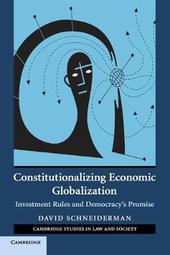
|
Constitutionalizing Economic Globalization: Investment Rules and Democracy's Promise
Paperback / softback
Main Details
| Title |
Constitutionalizing Economic Globalization: Investment Rules and Democracy's Promise
|
| Authors and Contributors |
By (author) David Schneiderman
|
| Series | Cambridge Studies in Law and Society |
|---|
| Physical Properties |
| Format:Paperback / softback | | Pages:340 | | Dimensions(mm): Height 228,Width 228 |
|
| ISBN/Barcode |
9780521692038
|
| Classifications | Dewey:346.092 |
|---|
| Audience | | Professional & Vocational | |
|---|
|
Publishing Details |
| Publisher |
Cambridge University Press
|
| Imprint |
Cambridge University Press
|
| Publication Date |
27 March 2008 |
| Publication Country |
United Kingdom
|
Description
Are foreign investors the privileged citizens of a new constitutional order that guarantees rates of return on investment interests? Schneiderman explores the linkages between a new investment rules regime and state constitutions - between a constitution-like regime for the protection of foreign investment and the constitutional projects of national states. The investment rules regime, as in classical accounts of constitutionalism, considers democratically authorized state action as inherently suspect. Despite the myriad purposes served by constitutionalism, the investment rules regime aims solely to enforce limits, both inside and outside of national constitutional systems, beyond which citizen-driven politics will be disabled. Drawing on contemporary and historical case studies, the author argues that any transnational regime should encourage innovation, experimentation, and the capacity to imagine alternative futures for managing the relationship between politics and markets. These objectives have been best accomplished via democratic institutions operating at national, sub-national, and local levels.
Author Biography
David Schneiderman is Professor of Law and Political Science at the University of Toronto Faculty of Law.
Reviews'Constitutionalising Economic Globalisation offers insightful commentary on some of the ongoing problems with international investment law, for example the regime's often opaque and unpredictable rules as well as its difficulty in accommodating genuine economic crises and environmental issues. As an author Schneiderman is an assiduous researcher (the case studies on Latin America and South Africa are particularly impressive) and for these reasons alone the book should be read by anyone with an interest in international investment law, especially those familiar with political philosophy. ... the application of domestic constitutional principles to the field of international investment law is a unique approach done skilfully.' Cambridge Law Journal
|